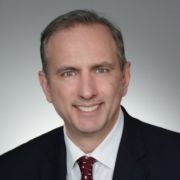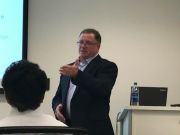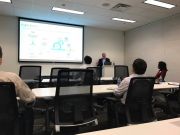By Kashif Choudry, PMP
The April PMI Atlanta Governance Forum hosted Joseph Sisto, Director of the Global Sales and Marketing PMO at IHG (Intercontinental Hotels Group). Joseph (Joe) initiated the topic - “Delivering Business Value with Technology – Running Technology as a Business”. The discussion centered around some new thinking around how to measure value, and insights on managing technology that are gaining traction with executives, and leading consulting firms.
Overview
 Joe’s presentation highlighted some key trends that are affecting major organizations:
Joe’s presentation highlighted some key trends that are affecting major organizations:
- Digital Transformation
- Managing Technology as a Business
- Innovation of the Product and Process Portfolio, and
- Re-evaluation of the Capitalization and Alignment of the Business.
What is changing?
Disruptive technology trends are creating new value possibilities – with rapid rollouts. This includes:
- Reengineering Technology
- “No Collar” workforce
- Enterprise Data Sovereignty
- The new “core” (automation/analytics/real-time analysis) baked into systems and processes, Digital reality (augmented and virtual reality), blockchain to blockchains, and the API imperative.
There is a need to explore and experiment with new technologies and partnerships! Currently, many people see IT as a cost and not as an investment to manage their business, but are at a new stage now where emerging technology is an asset to help.
As far as metrics and reporting, Joe showed a few examples of what sort of metrics are now considered important to executives and how partnerships are impacted by these metrics. The examples clearly showed how the traditional management of solely focusing on “on time, on budget, cost to implement” metrics are numbered. Technology Executives are being asked to harness disruptive technologies to evolve the business.
Joe also shared the ten principles of Technology Business Management:
- Find the true value of the work – match cost to time: map the data, make the dashboards based on the real metrics
- Find the quick hits –e.g. ITSM/data centers/high cost/low value apps / portfolio rationalization
- Track depreciation and amortization with the dashboards
- Map capital expenditure and operating expense across the IT portfolio
- Break out flex and variable expenses
- Determine allocations and cost recovery
- Determine direct and indirect costs
- Determine software project capitalization
- Make your future business cases real
- Use a new cost taxonomy and classification of costs moving forward – and manage the portfolio as investment / cost instead of prioritization on urgency / KTLO
The key message is that there is an abundance in availability of new capital in the market, given that we are in the ninth successive year of an economic upswing. And, in this environment, technology is not just something that needs to be “managed”; rather it needs to be explored and experimented with to realize value in this opportunity.
Special thanks to Joe Sisto for sharing his thought leadership. This is the third time that Joe has presented at the PMI Governance Forum, and we appreciate his willingness to share valuable ideas with the Atlanta PMI community.
We would also like to thank our sponsors at Global Payments for being our steady and supportive hosts for 4+ years.
If you would like to learn more about Governance and the value it brings to projects, please join us at a future forum. The calendar can be found on the PMI Atlanta web site at http://www.pmiatlanta.org
ABOUT PMI ATLANTA
Atlanta Chapter serves Project Management Community in Metro Atlanta, and we're an active resource to corporations, community and government agencies throughout north Georgia. With over 5,000 members, PMI Atlanta is among the top 5 chapters in the world. Our professional expertise span across industries; we’re the professionals building healthcare information technology systems, the engineers developing smarter public transportation, and the planners growing our communities more efficiently.




